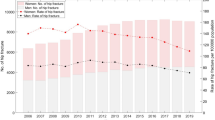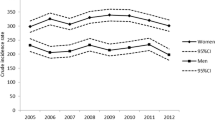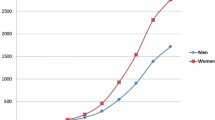Abstract
Summary
This study, characterising the incidence of hip fracture in Mexico, showed that age- and sex-specific rates increased between 2000 and 2006. The demographic changes estimated for Mexico indicate that the annual number of hip fractures will rise from 29,732 in 2005 to 155,874 in 2050. If the age-specific incidence of hip fracture continues, the number of hip fractures would increase by a further 46%.
Introduction
The aim of the present study was to determine time trends, if any, in hip fracture rates for Mexico and to forecast the number of hip fractures expected in Mexico over the coming years up to 2050.
Methods
All hip fracture cases registered during the years 2000–2006 were collected at all the second and tertiary-care hospitals across the country from one of the largest health systems in Mexico, The Instituto Mexicano del Seguro Social (IMSS).
Results
Between the years 2000 and 2006, the age-specific incidence of hip fracture increased significantly both for men and women by 1% per year (p = 0.016 and p < 0.001, respectively). In 2005, there were there were 29,732 hip fractures estimated in Mexico, 68% of which were found in women. Assuming no change in the age- and sex-specific incidence of hip fracture, the number of hip fractures was expected to increase markedly with time to 155,874 in 2050. Assuming that the age-specific incidence continues, the number of hip fractures in men and women would increase by a further 46% to 226,886 in 2050.
Conclusion
Demographic changes estimated for Mexico indicate that the annual number of hip fractures will rise from 29,732 in 2005 to 155,874 expected in 2050. If the age-specific incidence of hip fracture continues to rise, the number of hip fractures would increase by a further 46%.



Similar content being viewed by others
References
United Nations (2008) World population prospects: the 2008 revision. Population Division of the Department of Economic and Social Affairs of the United Nations Secretariat. Available at (http://esa.un.org/unpp/)
Gullberg B, Johnell O, Kanis JA (1997) World-wide projections for hip fractures. Osteoporos Int 7:407–413
Cooper C, Campion G, Melton LJ (1992) Hip fractures in the elderly: a worldwide projection. Osteoporos Int 2:285–289
Borges-Yanez A (1993) Transición demografica en México. Situación de la población anciana. [Demographic transition of Mexico. Situation of elderly population]. Bol Mens Epidemiol 8:81–88
Boletin de Informacion Estadistica (2002) Principales causas de egresos hospitalarios. Principales causas de egresos hospitalarios. 2002 Boletin de Informacion Estadistica II
Gomez Garcıa F, Figueroa FG (1988) Epidemiología de fracturas en mayores de 50 años (estudio de 1023 casos). [Epidemiology of fractures in subjects over 50 years of age (study of 1023 cases)]. Rev Mex Ortop Traumatol 2:114–118
Clark P, Lavielle P, Franco-Marina F, Ramırez E, Salmeron J, Kanis JA, Cummings SR (2005) Incidence rates and life-time risk of hip fractures in Mexicans over 50 years of age: a population-based study. Osteoporos Int 16:2025–2030
Koh LK, Saw SM, Lee JJ, Leong KH, Lee J (2001) Hip fracture incidence rates in Singapore 1991–1998. Osteoporos Int 12:311–318
Lau EM, Cooper C, Fung H, Lam D, Tsang KK (1999) Hip fracture in Hong Kong over the last decade—a comparison with the UK. J Public Health Med 21:249–250
Hagino H, Katagiri H, Okano T, Yamamoto K, Teshima R (2005) Increasing incidence of hip fracture in Tottori Prefecture, Japan: trend from 1986 to 2001. Osteoporos Int 16:1963–1968
Hagino H, Furukawa K, Fujiwara S, Okano T, Katagiri H, Yamamoto K et al (2009) Recent trends in the incidence and lifetime risk of hip fracture in Tottori, Japan. Osteoporos Int 20:543–548
Evans JG, Seagroatt V, Goldacre MJ (1997) Secular trends in proximal femoral fracture, Oxford record linkage study area and England 1968–86. J Epidemiol Community Health 51:424–429
Melton LJ III, O'Fallon WM, Riggs BL (1987) Secular trends in the incidence of hip fractures. Calcif Tissue Int 41:57–64
Melton LJ III, Kearns AE, Atkinson EJ, Bolander ME, Achenbach SJ, Huddleston JM et al (2009) Secular trends in hip fracture incidence and recurrence. Osteoporos Int 20:687–694
Zain Elabdien BS, Olerud S, Karlstrom G, Smedby B (1984) Rising incidence of hip fracture in Uppsala, 1965–1980. Acta Orthop Scand 55:284–289
Rodriguez JG, Sattin RW, Waxweiler RJ (1989) Incidence of hip fractures, United States, 1970–83. Am J Prev Med 5:175–181
Zingmond DS, Melton LJ III, Silverman SL (2004) Increasing hip fracture incidence in California Hispanics, 1983 to 2000. Osteoporos Int 15:603–610
Levy AR, Mayo NE, Grimard G (1995) Rates of transcervical and pertrochanteric hip fractures in the province of Quebec, Canada, 1981–1992. Am J Epidemiol 142:428–436
Jaglal SB, Weller I, Mamdani M, Hawker G, Kreder H, Jaakkimainen L et al (2005) Population trends in BMD testing, treatment, and hip and wrist fracture rates: are the hip fracture projections wrong? J Bone Miner Res 20:898–905
Mann E, Meyer G, Haastert B, Icks A (2010) Comparison of hip fracture incidence and trends between Germany and Austria 1995–2004: an epidemiological study. BMC Public Health 10:46 (PubMed PMID: 20113471; PubMed Central PMCID: PMC2831031)
Icks A, Haastert B, Wildner M, Becker C, Meyer G (2008) Trend of hip fracture incidence in Germany 1995–2004: a population-based study. Osteoporos Int 19:1139–1145
Pentek M, Horvath C, Boncz I, Falusi Z, Toth E, Sebestyen A et al (2008) Epidemiology of osteoporosis related fractures in Hungary from the nationwide health insurance database, 1999–2003. Osteoporos Int 19:243–249
Goettsch WG, de Jong RB, Kramarz P, Herings RM (2007) Developments of the incidence of osteoporosis in the Netherlands: a PHARMO study. Pharmacoepidemiol Drug Saf 16:166–172
Chevalley T, Guilley E, Herrmann FR, Hoffmeyer P, Rapin CH, Rizzoli R (2007) Incidence of hip fracture over a 10-year period (1991–2000): reversal of a secular trend. Bone 40:1284–1289
Fielden J, Purdie G, Horne G, Devane P (2001) Hip fracture incidence in New Zealand, revisited. NZ Med J 114:154–156
Boufous S, Finch CF, Lord SR (2004) Incidence of hip fracture in New South Wales: are our efforts having an effect? Med J Aust 180:623–626
Lofthus CM, Osnes EK, Falch JA, Kaastad TS, Kristiansen IS, Nordsletten L et al (2001) Epidemiology of hip fractures in Oslo, Norway. Bone 29:413–418
Rogmark C, Sernbo I, Johnell O, Nilsson JA (1999) Incidence of hip fractures in Malmo, Sweden, 1992–1995. A trend break. Acta Orthop Scand 70:19–22
Frandsen PA, Kruse T (1983) Hip fractures in the county of Funen, Denmark. Implications of demographic aging and changes in incidence rates. Acta Orthop Scand 54:681–686
Giversen IM (2006) Time trends of age-adjusted incidence rates of first hip fractures: a register-based study among older people in Viborg County, Denmark, 1987–1997. Osteoporos Int 17:552–564
Kanis JA, Oden A, Johnell O, Jonsson B, de Laet C, Dawson A (2001) The burden of osteoporotic fractures: method for setting intervention thresholds. Osteoporos Int 12:417–427
Spector TD, Cooper C, Lewis AF (1990) Trends in admissions for hip fracture in England and Wales, 1968–85. BMJ 300:1173–1174
Kannus P, Niemi S, Parkkari J, Palvanen M, Vuori I, Jarvinen M (2006) Nationwide decline in incidence of hip fracture. J Bone Miner Res 21:1836–1838
Kaastad TS, Meyer HE, Falch JA (1998) Incidence of hip fracture in Oslo, Norway: differences within the city. Bone 22:175–178
Cummings SR, Melton LJ (2002) Epidemiology and outcomes of osteoporotic fractures. Lancet 359:1761–1767
Bacon WE, Maggi S, Looker A, Harris T, Nair CR, Giaconi J, Honkanen R, Ho SC, Peffers KA, Torring O, Gass R, Gonzalez N (1996) International comparison of hip fracture rates in 1988–89. Osteoporos Int 6:69–75
Kanis JA, Johnell O, De Laet C, Jonsson B, Oden A, Ogelsby AK (2002) International variations in hip fracture probabilities: implications for risk assessment. J Bone Miner Res 17:1237–1244
Elffors I, Allander E, Kanis JA et al (1994) The variable incidence of hip fracture in southern Europe: the MEDOS study. Osteoporos Int 4:253–263
Mann E, Icks A, Haastert B, Meyer G (2008) Hip fracture incidence in the elderly in Austria: an epidemiological study covering the years 1994 to 2006. BMC Geriatr 8:35
Roy DK, Pye SR, Lunt M, O'Neill TW, Todd C, Raspe H et al (2002) Falls explain between centre differences in the incidence of limb fracture across Europe. Bone 31:712–717
Johnell O, Borgstrom F, Jonsson B, Kanis J (2007) Latitude, socioeconomic prosperity, mobile phones and hip fracture risk. Osteoporos Int 18:333–337
Ahlborg GH, Johnell O, Jarvinen TLN, Karlsson MK (2004) Prevalence of low bone mass in women: secular trends over 30 years. J Bone Miner Res 19(suppl 1):S49
Joakimsen R, Magnus J, Fonnebo V (1997) Physical activity and predisposition for hip fractures: a review. Osteoporos Int 7:503–513
Berard A, Bravo G, Gauthier P (1997) Meta-analysis of the effectiveness of physical activity for the prevention of bone loss in postmenopausal women. Osteoporos Int 7:331–337
Martyn CN, Cooper C (1999) Prediction of burden of hip fracture. Lancet 353:769–770
Acknowledgements
The authors gratefully acknowledge Dr. José Luis Vasquez Martínez and Dr. María Guadalupe Mercadillo Pérez from the Division de Informática en Salud (Division of Informatics in Health) and the Instituto Mexicano del Seguro Social IMSS for their help.
Conflicts of interest
None.
Author information
Authors and Affiliations
Corresponding author
Rights and permissions
About this article
Cite this article
Johansson, H., Clark, P., Carlos, F. et al. Increasing age- and sex-specific rates of hip fracture in Mexico: a survey of the Mexican institute of social security. Osteoporos Int 22, 2359–2364 (2011). https://doi.org/10.1007/s00198-010-1475-z
Received:
Accepted:
Published:
Issue Date:
DOI: https://doi.org/10.1007/s00198-010-1475-z




